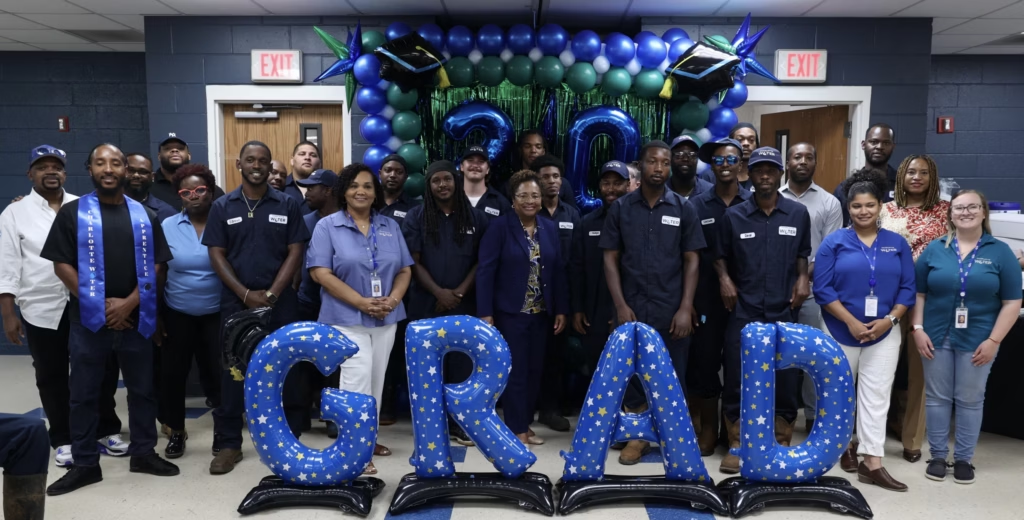Charlotte Water’s workforce program builds careers, community
August 5, 2025

AWWA Articles
Charlotte Water’s workforce program builds careers, community
Charlotte Water’s workforce development program is tackling more than just job vacancies; it’s building a more prosperous community.
The initiative began in 2018 after a study revealed that individuals born into poverty in Charlotte were likely to remain in poverty. Charlotte Water officials took note: They frequently had vacancies in roles that paid living wages, and they wanted to create a community that had economic mobility.
Six months after receiving the charge, Carolyn Ross, people strategy manager at Charlotte Water, launched an apprenticeship program to train entry-level utility technicians, a role that was hard to fill. The utility often had 50 to 60 vacancies, and the position afforded opportunities for growth over time.
“Part of this was us really trying to make sure the community we lived in understood the careers that were available, and to get to know the utility because most people don’t even know who we are,” Ross said. “This was an entry-level way for us to build those relationships, but then also make sure that we have opportunities for the people that live here to work for the city of Charlotte.”
The apprenticeship program started with six participants. It includes a five-week, on-the-job bootcamp and training at a mock work site that allows participants to practice digging and using large equipment. An added feature is an in-house Commercial Driver’s License (CDL) training, which benefits participants who normally would need to seek the license from an external provider.

The most recent workforce development cohort enrolled 67 participants across three distinct programs: apprenticeships, a Career Training Academy, and a Ph.D. fellowship, encompassing up to 20 different roles for Charlotte Water.
“That’s what I’m really proud of,” said Paula Holmes, workforce development lead at Charlotte Water. “We’re not only just doing entry-level training, but we’re providing more advanced opportunities.”
The Career Training Academy is a seven-month program that teaches adults financial literacy, interpersonal skills, and safety skills that aim to make them attractive to any employer, whether it’s Charlotte Water or not.
“There is initially no intent to hire from this program,” Ross said. “We just want to bring them in and provide transferable skills. Even if they don’t get employed by the city of Charlotte … they could work somewhere in our community.”
It’s also a way to build buy-in internally for training programs like these. “There’s a lot of upfront work to build trust, because this is often nontraditional hiring,” Ross said, pointing out that candidates come in with a dearth of experience but a genuine interest to learn.
For example, when a wastewater treatment plant was scheduled to open, the workforce development team brought 13 participants into its Career Training Academy. “It was our first time working with this team,” Holmes said. They offered the academy training — which is more akin to an internship — rather than an apprenticeship, which ultimately requires job placement. The wastewater treatment division was so impressed by the participants, though, that they hired 12 of the 13. Now leaders are exploring a formal apprenticeship program.
Nowadays, the vacancy rate for the utility technician role — which started the workforce development efforts at Charlotte Water — is half of what it used to be. And last month, the U.S. Environmental Protection Agency featured Charlotte Water in a webinar spotlighting innovation in workforce development.
Perhaps most gratifying for leaders has been seeing the community that is built within these programs and the social and economic capital that comes along with it.
“They build a bond and a relationship,” Ross said of members in each cohort, noting they often form group texts to stay connected. “When someone gets their CDL permit or someone gets their license, they celebrate each other.”
Holmes added: “And we get to brag because they are doing so good. … We admire the things that they do and how they contribute to our communities. Seeing that growth is just a pleasure for us.”
Advertisement